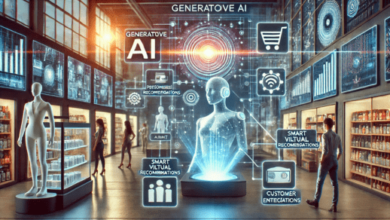
AI in Healthcare: Transforming Diagnosis, Treatment, and Research
Artificial Intelligence (AI) has revolutionized various industries, and healthcare is no exception. The integration of AI technologies into healthcare systems is transforming the way we diagnose illnesses, develop treatment plans, and conduct medical research. From enhancing diagnostic accuracy to enabling personalized medicine, AI is poised to reshape the healthcare landscape in profound ways.
Medical Imaging and Diagnosis: AI algorithms excel in analyzing medical images, such as X-rays, MRIs, and CT scans. They can detect subtle patterns and anomalies that might be missed by human eyes, leading to earlier and more accurate diagnoses.
Drug Discovery and Development: AI accelerates drug discovery by analyzing vast datasets to identify potential drug candidates. Machine learning models predict the efficacy and safety of compounds, streamlining the research process.
Personalized Treatment Plans: AI analyzes patient data to create personalized treatment plans. Factors like genetics, medical history, and lifestyle are considered to tailor treatments that have the highest likelihood of success.
Predictive Analytics: AI algorithms predict disease outbreaks and patient outcomes based on historical data. This aids in resource allocation, healthcare planning, and early intervention.
Natural Language Processing (NLP): NLP enables AI to understand and process human language. It’s used in medical transcription, patient records analysis, and even chatbots that provide medical information.
Robot-Assisted Surgery: AI-powered robots assist surgeons by enhancing precision and reducing invasiveness. They can be used in delicate procedures, improving patient outcomes.
Remote Patient Monitoring: IoT devices connected to AI systems enable continuous monitoring of patients’ vital signs and health metrics. This facilitates early detection of abnormalities and reduces hospital readmissions.
Genomic Analysis: AI analyzes genomic data to identify genetic mutations linked to diseases. This information informs diagnosis and helps develop targeted therapies.
Radiation Therapy Planning: AI optimizes radiation therapy by calculating the most effective treatment plan while minimizing damage to healthy tissues.
Drug Dosage Prediction: AI predicts the optimal drug dosage for individual patients, reducing the risk of adverse effects and increasing treatment efficacy.
While the potential of AI in healthcare is immense, there are challenges to address, including data privacy, regulatory compliance, and ensuring that AI systems are transparent and interpretable. Collaborations between medical professionals, AI researchers, and regulatory bodies are vital to ensuring the responsible and effective deployment of AI technologies in healthcare.
In conclusion, AI is revolutionizing healthcare by enhancing diagnosis, treatment, and research capabilities. Its ability to analyze vast amounts of data and recognize complex patterns holds the promise of more accurate diagnoses, personalized treatments, and improved patient outcomes.



